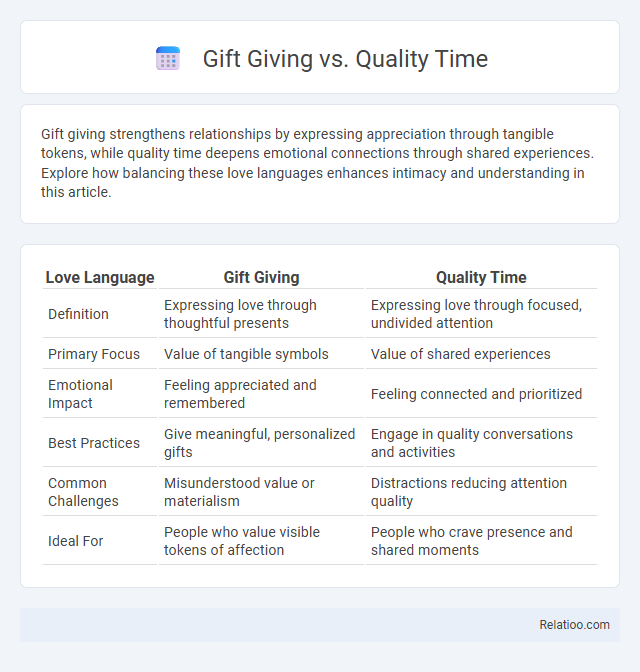Gift giving strengthens relationships by expressing appreciation through tangible tokens, while quality time deepens emotional connections through shared experiences. Explore how balancing these love languages enhances intimacy and understanding in this article.
Table of Comparison
| Love Language | Gift Giving | Quality Time |
|---|---|---|
| Definition | Expressing love through thoughtful presents | Expressing love through focused, undivided attention |
| Primary Focus | Value of tangible symbols | Value of shared experiences |
| Emotional Impact | Feeling appreciated and remembered | Feeling connected and prioritized |
| Best Practices | Give meaningful, personalized gifts | Engage in quality conversations and activities |
| Common Challenges | Misunderstood value or materialism | Distractions reducing attention quality |
| Ideal For | People who value visible tokens of affection | People who crave presence and shared moments |
Understanding Gift Giving: Symbolism and Impact
Understanding gift giving involves recognizing its deep symbolism, where each present conveys emotions, appreciation, or cultural significance beyond its material value. Quality time, often contrasted with gift giving, emphasizes shared experiences that strengthen relationships through presence and attention rather than objects. The impact of gift giving is amplified when combined with meaningful interactions, fostering lasting emotional connections and reinforcing social bonds.
The Value of Quality Time in Relationships
Quality time in relationships fosters deeper emotional connections and strengthens bonds more effectively than material gifts alone. Your presence and shared experiences create lasting memories that enhance trust, communication, and mutual understanding. Prioritizing quality time demonstrates genuine care and attention, which often holds greater significance than the value of any gift.
Emotional Connection: Gifts vs Shared Experiences
Gift giving often creates tangible reminders of affection, enhancing emotional connection through thoughtful tokens. Quality time fosters deeper bonds by allowing meaningful interactions and shared experiences that build lasting memories. While gifts can symbolize care, shared moments typically strengthen emotional ties more effectively by promoting presence and engagement.
Cultural Perspectives on Gift Giving and Quality Time
Cultural perspectives deeply influence how gift giving and quality time are valued and expressed, shaping the meaning behind each gesture. In collectivist cultures, gift giving often symbolizes respect, gratitude, and social bonds, while quality time may emphasize group activities and shared experiences. Your understanding of these cultural nuances ensures that your expressions of appreciation resonate meaningfully across diverse traditions.
Personality Types: What Do We Prefer?
Different personality types often show distinct preferences among gift giving, quality time, and receiving gifts, influenced by their emotional needs and communication styles. For example, extroverted individuals may value quality time as it satisfies their social connection needs, while introverted personalities might appreciate thoughtful gifts that reflect personal understanding. Understanding these preferences can enhance relationships by aligning gestures with personality-driven expressions of love and appreciation.
Practical Considerations: Time, Money, and Effort
Gift giving often requires careful budgeting and time management, as selecting, purchasing, and wrapping presents can be costly and time-consuming. Quality time demands emotional investment and scheduling effort, prioritizing shared experiences over material goods, which may be more meaningful but less tangible. Balancing these approaches involves considering personal financial constraints, availability, and the recipient's preferences to maximize the impact and sincerity of the gesture.
Celebrating Occasions: Presents or Presence?
Choosing between gift giving and quality time depends on the occasion and personal preferences. Birthdays and holidays often emphasize presents as tangible expressions of care, while anniversaries and family gatherings highlight shared experiences and meaningful interactions. Balancing both gifts and presence can create memorable celebrations that honor relationships and deepen connections.
Long-term Effects on Relationship Satisfaction
Gift giving often provides immediate gratification but may have limited long-term effects on relationship satisfaction compared to quality time, which fosters deeper emotional bonds and consistent positive interactions. Quality time strengthens communication and mutual understanding, essential components for sustaining relationship satisfaction over time. Your focus on shared experiences creates lasting memories that enhance intimacy and trust beyond the temporary pleasure of material gifts.
Navigating Expectations: Communication and Compromise
Navigating expectations in gift giving, quality time, and gifts hinges on open communication and mutual compromise to ensure both partners feel valued. Expressing your preferences clearly helps avoid misunderstandings and fosters a deeper emotional connection. Prioritizing honest dialogue creates a balanced approach, blending tangible presents with meaningful shared experiences that resonate with your relationship's unique dynamics.
Finding Balance: Integrating Gifts and Quality Time
Finding balance between gift giving and quality time enhances the overall experience of showing appreciation and love. You can create meaningful connections by combining thoughtful presents with shared moments, ensuring that neither feels overshadowed. Prioritizing both elements fosters stronger relationships and lasting memories.

Infographic: Gift Giving vs Quality Time
 relatioo.com
relatioo.com